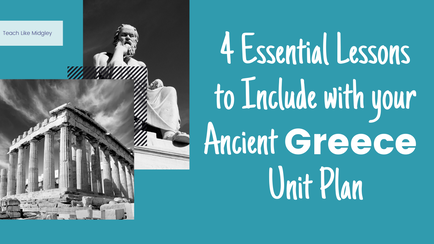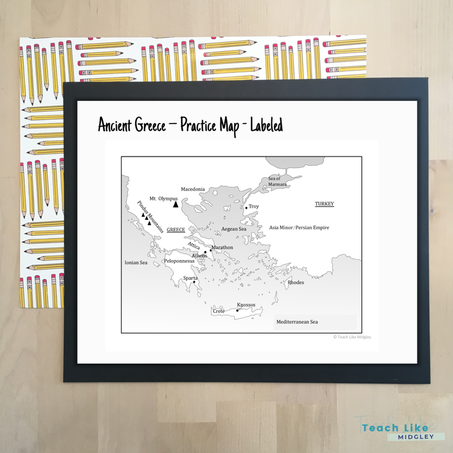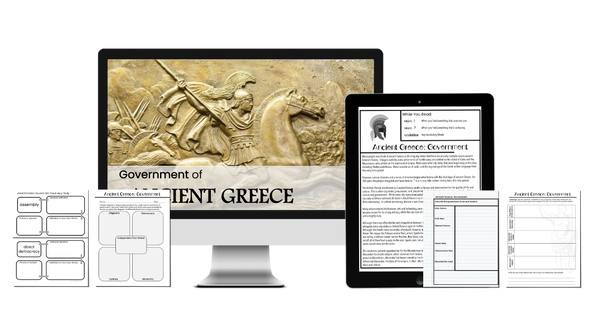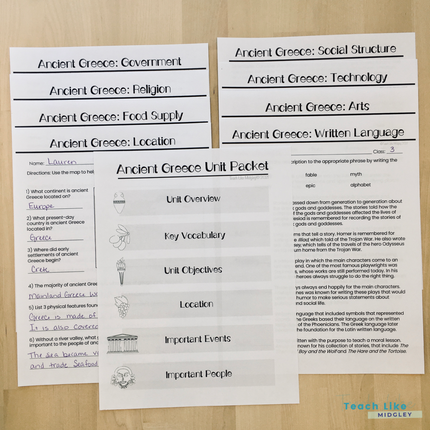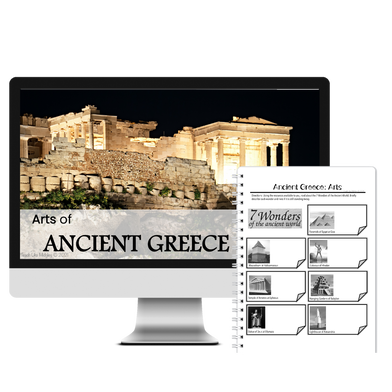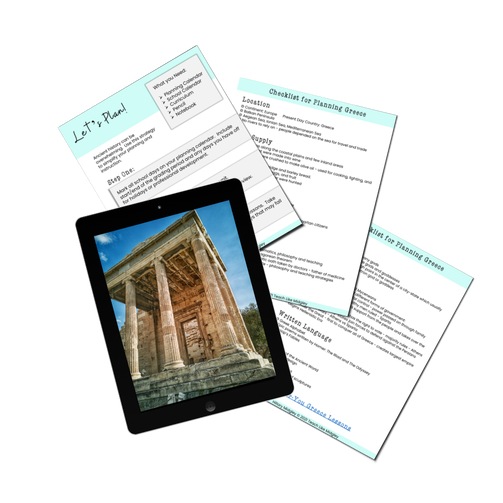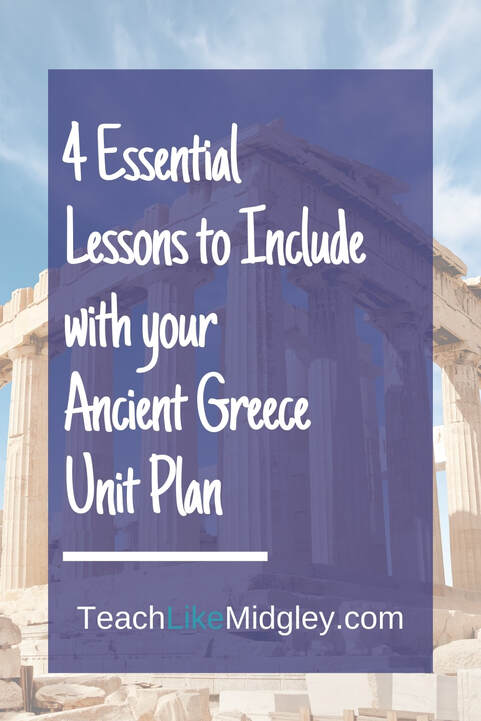4 Essential Lesson Plans for Your
Ancient Greece Unit
When someone mentions ancient Greece, what comes to mind?
Mythology? Big white columns? The Olympics? Sparta?
Ancient Greece is another unit that is full of fun and intrigue. And just like ancient Egypt, it’s easy to get caught up in the glamor of it all. Which makes it all the more important that we take the time to plan out our unit to include all the essentials.
Mythology? Big white columns? The Olympics? Sparta?
Ancient Greece is another unit that is full of fun and intrigue. And just like ancient Egypt, it’s easy to get caught up in the glamor of it all. Which makes it all the more important that we take the time to plan out our unit to include all the essentials.
But what are those essentials? I have seen many teachers what to spend their time focusing on the Olympics. Or just spend time learning about the achievements of Athens.
Of course, there is more to teaching ancient Greece. In this post, you’ll learn about 4 essential lessons you should include when planning out your ancient Greece unit for your 6th grade class.
#1 Location & Map Study
Every unit of an ancient civilization curriculum should not only include, but start with location and map study.
Sixth graders need you to emphasize continent and present-day countries when learning the locations of ancient societies.
But you must also incorporate the geographical features into your discussions, and how they affected daily life. This is extremely important to understanding ancient Greece.
The landforms affected everything from the development of independent city-states, to farming crops, and relying on the sea for travel and trade.
In most curriculums, ancient Greece is the first society to not have developed along a river valley. It’s crucial to help students see this and understand the result.
Sixth graders need you to emphasize continent and present-day countries when learning the locations of ancient societies.
But you must also incorporate the geographical features into your discussions, and how they affected daily life. This is extremely important to understanding ancient Greece.
The landforms affected everything from the development of independent city-states, to farming crops, and relying on the sea for travel and trade.
In most curriculums, ancient Greece is the first society to not have developed along a river valley. It’s crucial to help students see this and understand the result.
#2 Different Forms of Government
With the unique geography of ancient Greece comes the development of individual city-states, each with their own forms of government.
Many already know the original concept of democracy comes from ancient Greece, more specifically, from the city-state of Athens.
But other forms of government were used in various Greek city-states as well. When teaching ancient Greece be sure to cover monarchy, oligarchy, tyranny, and democracy as types of governments.
For each form, it’s most helpful for students if you focus on two parts: who held the power and how did they gain that power.
Many already know the original concept of democracy comes from ancient Greece, more specifically, from the city-state of Athens.
But other forms of government were used in various Greek city-states as well. When teaching ancient Greece be sure to cover monarchy, oligarchy, tyranny, and democracy as types of governments.
For each form, it’s most helpful for students if you focus on two parts: who held the power and how did they gain that power.
#3 What Makes Greek City-States Greek
Most people in ancient Greece did not refer to themselves as Greek. They would usually refer to the city-state where they lived. If they were from Athens, they called themselves Athenians. If they were from Sparta, they were Spartans.
When we teach ancient civilizations with structure, it becomes easier to understand what made all of these city-states Greek.
Not sure what I’m referring to? Read this blog post: How to Teach Ancient Civilizations the Easy Way
Although each city-state was unique, they shared commonalities such as the use of the same writing system and belief in the same myths and gods.
And although the stronger city-states of Sparta and Athens often competed with each other, they also joined forces with other city-states to fight off the Persians when they threatened to invade and conquer Greece.
When we teach ancient civilizations with structure, it becomes easier to understand what made all of these city-states Greek.
Not sure what I’m referring to? Read this blog post: How to Teach Ancient Civilizations the Easy Way
Although each city-state was unique, they shared commonalities such as the use of the same writing system and belief in the same myths and gods.
And although the stronger city-states of Sparta and Athens often competed with each other, they also joined forces with other city-states to fight off the Persians when they threatened to invade and conquer Greece.
#4 Greek Contributions
A crucial part to learning about any ancient civilization is discovering what achievements they accomplished in the areas of art and technology.
Ancient Greece is remembered for many famous philosophers like Socrates, Plato, and Aristotle. Along with other important people like Hippocrates who became known as the father of medicine and developed the Hippocratic Oath taken by doctors still today.
Then of course there are the glorious marble columns that were built with three distinct designs that have been copied over the years by many societies. We see them today in the architecture of the government buildings in America.
The Olympic Games even began in ancient Greece and is today a world-wide tradition that many countries take part in.
Ancient Greece is remembered for many famous philosophers like Socrates, Plato, and Aristotle. Along with other important people like Hippocrates who became known as the father of medicine and developed the Hippocratic Oath taken by doctors still today.
Then of course there are the glorious marble columns that were built with three distinct designs that have been copied over the years by many societies. We see them today in the architecture of the government buildings in America.
The Olympic Games even began in ancient Greece and is today a world-wide tradition that many countries take part in.
Ready to Roll Materials...
There are many more lessons you can include with your unit on ancient Greece, but these 4 items are at the core and should not be left out. If you are looking for more guidance as to what to include, then be sure to utilize my done-for-you Planning Checklist for Ancient Greece.
It’s always best to use the resources that are provided for you by your school district. However, as many of you know, not every teacher is provided the materials they need. Which is exactly why I developed a line of Ancient Greece Lesson Sets that will provide you with everything you need to teach each essential concept to your students.
It’s always best to use the resources that are provided for you by your school district. However, as many of you know, not every teacher is provided the materials they need. Which is exactly why I developed a line of Ancient Greece Lesson Sets that will provide you with everything you need to teach each essential concept to your students.
You May Also Like...
Let's Connect...

Welcome! I'm Hillary Midgley, a veteran 6th grade teacher.
I create educational materials and develop curriculum for other teachers. I specialize in teaching students how to learn through my Study Skills Curriculum. I have established fundamental classroom systems and structures for teachers to help them streamline their classroom. And my passion is teaching ancient history through engaging activities with foundations in academic skills. Here you will find resources on all of these topics and more. Learn more about me here.
|

